Sharing your information gives you direct access to a dedicated enrollment counselor and tailored materials based on your specific interests.
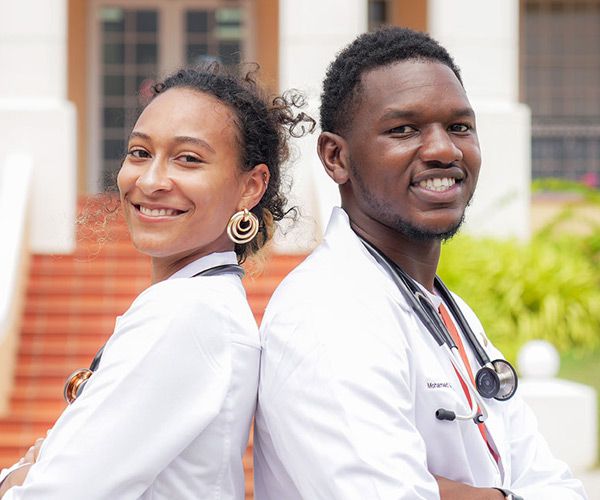
Vector-borne diseases, aquatic animal health, parasitology, and zoonoses and public health constitute our four areas of research emphasis. University collaborations and a One Health approach to research are facilitated by a shared campus with the SGU School Of Medicine and its Department of Public Health and Preventive Medicine.
All of our areas of emphasis involve DVM students. Our research has resulted in strong international collaborations because of our location, our domestic and wild animal fauna, the infectious diseases currently circulating on our island, and our enthusiastic students and energetic and qualified research faculty.
The high cost of a private medical education is a concern for many students. St. George’s University’s School of Medicine is approved for its students to participate in the US Direct Loan Program and, in addition, the School of Medicine offers a variety of scholarships to help defray the costs of medical education. If paying for medical school has you concerned, please explore this page for financial aid options, including US federal student aid, scholarships for academic excellence, and need-based scholarships generally for international students.
The Office of Financial Aid administers the financial aid available to St. George’s University students, assists in financial planning, budgeting, and completion of the application process; and counsels students regarding management of their educational debt.
The majority of financial aid is received in the form of loans that are to be repaid after the student finishes his or her studies.
Tick-borne diseases in dogs
E. canis, and A. platys have been studied in dogs in all parishes of Grenada, Petit Martinique, and Carriacou. These studies include faculty in the departments of SAMS and PTHB and utilize traditional PCR assays, commercial serological assays and novel newly developed serological and molecular multiplex assays (Magpix, Luminex®). Screening for tick-borne pathogens in dogs, ruminants, and ticks is ongoing in collaboration with Dr. Roman Ganta, Director of the Center of Excellence of Vector Borne Diseases, Kansas State University.
Tick-borne diseases in large animals
SVM faculty are involved in prevalence of tick-borne diseases in large animals and small ruminants and the prevalence and species of ticks in Grenada. Blood and ticks have been collected from horses on Grenada, Barbados and Curacao and antibody titers for Babesia equi have been measured using the C6 ELISA. The samples are currently being evaluated for the presence of tick-borne pathogens using the PCR-Reverse Line Blot technique.
Ehrlichia and heartworm prevention/treatment studies in dogs
Ehrlichia prevention studies in dogs have been underway since 2012. The objective is to determine if low dose doxycycline can prevent Ehrlichia in dogs newly introduced to Grenada. A recently completed 2-year efficacy study evaluated Advantage Multi® as a treatment for dogs with naturally-occurring Dirofilaria immitis infection. Both of these studies have the potential to impact treatment and prevention of these high prevalence pathogens in dogs in Grenada and the region.
Mosquito-transmitted viruses in mosquitoes and bats
Bats are increasingly recognized as reservoir hosts for a number of high impact human viruses. Grenada is endemic for Dengue virus and in 2014 Chikungunya virus was introduced and in 2015 Zika virus was introduced. In 2014, 4 SVM faculty initiated a study to determine whether any of these human pathogenic mosquito-transmitted virus infect bats under natural conditions. This project led to collaborations with a bat expert at the University of Washington and a bat/virus expert at Colorado State University, both of whom came to SGU as Research Visiting Professors and continue to collaborate with us. Samples from bats collected for the viral pathogen studies are also being used to identify zoonotic bacteria including Campylobacter, Salmonella, pathogenic E. coli and rickettsia and other zoonotic pathogens such as Leptospira and hantaviruses.
SVM faculty recently initiated a yearlong surveillance project to determine the presence of arboviral pathogens in wild-caught mosquitos collected throughout Grenada, 1 year after the 2016 Zika outbreak. They are collaborating with Louisiana State University (LSU) Department of Entomology and the LSU Genomics Facility to use next-generation sequencing technologies to identify and sequence viruses associated with human and animal diseases in Aedes aegypti and Culex quinquefasciatus mosquitoes caught in Grenada. Tissues and blood from bats have been collected to determine if they are a host for any viruses identified by sequencing.
Research is an essential component of the Aquatic Animal Medicine Program’s (AAMP) mission of advancing aquatic animal health. Faculty in the AAMP have particularly strong records of scientific publication in pathology and diseases of aquatic wildlife and aquaculture raised fish.
Central to this research is the ocean-front, 2,200 square foot Aquatic Animal Medicine Research Laboratory (AAMRL) that houses saltwater and freshwater animal holding facilities, a diagnostic laboratory with molecular capacities and benchtop space, and a multi-media classroom.
The capabilities of the AAMRL are among the best in the Caribbean and the facility serves as a regional hub for diagnostics and research. Graduate and veterinary student-driven research includes applied projects influencing local and global aquatic animal health.
Marine Turtle Conservation
In collaboration with Ocean Spirits Inc., there is ongoing research to support the local green, hawksbill, and leatherback turtle populations in Grenada. This includes characterizing causes of morbidity and mortality. Health assessments and studies on infectious disease surveillance are performed on nesting and free-swimming turtles. Grenada is home to active leatherback nesting beaches and ongoing research strives to study and enhance hatchling survivability. As part of the broader picture, additional research examines the effect of an educational curriculum on attitudes and perceptions of grade school students on sea turtle conservation in Grenada.
Reef Ecosystem Health
A multi-tiered approach is being used to study Grenada’s inshore reef ecosystems. Invasive lionfish are being evaluated for their susceptibility to bacterial, viral, parasitic and fungal pathogens and their risk for spreading pathogens in the Caribbean Sea. Lionfish are also being explored as potential sentinel and laboratory models to monitor and study environmental health. In collaboration with the University of Guelph, coral reef mapping combined with proteomic studies are being performed to better understand coral regeneration.
Sustainable Aquaculture
Faculty and students are engaged in developing sustainable aquaculture on a global and local scale. This includes better characterizing major and emerging pathogens of tilapia, catfish, and salmonids. The AAMRL also provides diagnostics and research support to the local aquaponics industry in Grenada. This includes a selective breeding program for growth in tilapia and characterizing infectious disease risks present in Grenadian wild and cultured fish.
Zoonoses and Public Health Research Emphasis reflects a OHOM approach facilitated by collaborations between the SVM and the academic Department of Public Health and Preventive Medicine within the SOM. The DVM/MPH students are major participants in this research focus area. Research areas include seroprevalence studies of zoonotic agents in various domestic and wild animals and antimicrobial resistance patterns and molecular typing of zoonotic pathogens.
These efforts are enhanced by collaborations with US based institutions, including Washington State University and the University of Florida. In addition to pathogen-based research, SVM faculty and DVM/MPH students are involved in a study on pet ownership and its effect on academic performances among veterinary students.
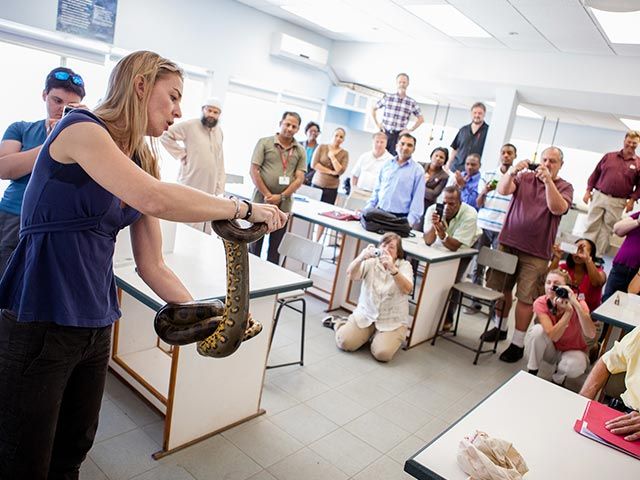
Parasitology Research objectives focus on the pathobiology of parasites and zoonotic parasitic diseases of importance to the region. Grenada is an excellent setting in which meaningful parasitology research is possible because of location and environmental conditions. The program is international and includes collaborations involving both students and faculty in Morocco, Uganda, Kenya, Turkey, Romania, Peru, Brazil, Guyana, St. Lucia, and the Dominican Republic.
The SVM parasitology faculty have long standing research and teaching collaborations with WINDREF, the SOM, the University of Georgia and the National Wildlife Health Center (U. S. Geological Survey). SGUSVM recently became part of the Veterinary Parasitology Diagnostic Network (VetPDx) which is a novel collaborative effort of parasitology diagnostic laboratories in the United States and Canada.
Examples of current projects include: anthelmintic resistance of gastrointestinal parasites in small ruminants in Grenada; parasites in Norway rats in Grenada; the prevalence of hookworm species in Fiji within the free-roaming dog population. The addition of a molecular entomologist to our faculty has expanded our focus to include PCR identification of fish parasites, ectoparasites of honey bees and the pathogens they transmit.
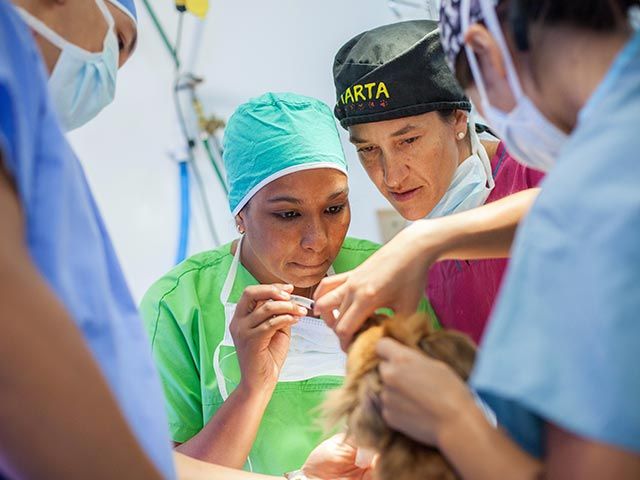
View the SVM faculty involved in research and SVM Adjunct and Cooperating faculty who collaborate with SVM researchers. SVM faculty also collaborate with many other researchers at institutions in North and South America, Europe, Africa and Asia. These collaborations are reflected within the individual SVM faculty research profile.

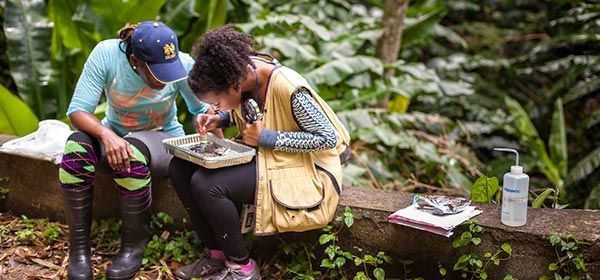
Currently all students in the DVM program participate in the core Veterinary Research Investigator (VRI) courses starting in Term 1 and extending through Term 4 of the DVM curriculum. This series is designed to introduce student to biomedical research and its impact on all veterinary career tracks. The series takes the students through all aspects of the research process including research ethics, literature retrieval and review, problem identification, hypothesis formulation, proposal writing, data collection and analysis, oral presentation and manuscript preparation.
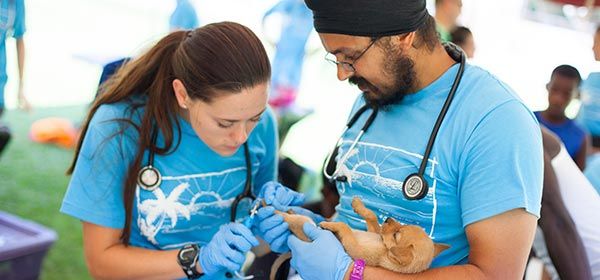
The Island Veterinary Scholars Program (IVSP), co-sponsored by Merial (2012-2017) and Boehringer Ingelheim (2017-present) was started at SGUSVM in 2012 and has been instrumental in immersing veterinary students in hypothesis-based research during the summer break. With a wide variety of Grenada-related research topics, including vector-borne disease, public health, molecular techniques and invasive species. The faculty mentored IVSP scholars own their research project, from background research on the topic, hypothesis development, performing research, analyzing data and presenting their findings at the sponsored symposium held in the United States. The IVSP encompasses an entire summer program by providing interactive lectures on scientific writing, guest speakers to discuss a variety of veterinary and One Health topics (e.g., IACUC, government-based research and public health implications of research), research-related field trips and laboratory-based workshops to teach a variety of research-related techniques. SGUSVM students have also joined veterinary scholars programs offered by other AVMA-accredited veterinary institutions, including the University of Missouri College of Veterinary Medicine, North Carolina State University College of Veterinary Medicine, Virginia-Maryland College of Veterinary Medicine, the University of Georgia College of Veterinary Medicine and the Nationale Veterinary School of Alfort in France.
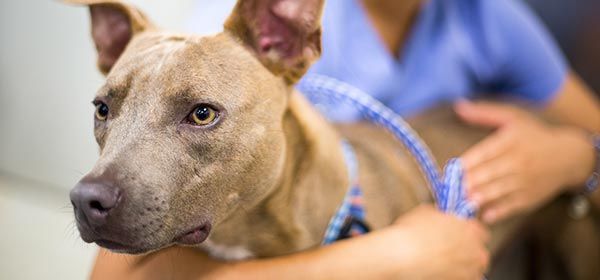
The Veterinary Student Research Initiative (VSRI) was established in the spring of 2017. This program is designed for students who want more involvement in research with one-on-one faculty mentorship but are not able to take on the time and effort required for an MSc degree. Upon completion of all the requirement these students receive a “distinction in research” on their transcripts. The expectation is that they will actively participate in all aspects of the research process, including lab and field work, presentations and manuscript preparation. This intensive mentorship program is intended to provide motivated students with an in depth research experience in a flexible time frame. Each successful applicant receives research support funded by the SVM research enhancement budget. The program currently has 5 students involved in 4 projects with 2 new projects and 2 more students starting in the Spring of 2018. There are also 6 students who were involved in research at the time the program was created that are seeking retrospective recognition, as they have completed all the necessary requirements.

Student Research Assistant employment program: This program provides students who are in good academic standing the opportunity for paid work on research projects. The number of students involved in this program ranges from about 10-20 per year, with 18 students employed in 2017. If Student Assistants contribute substantially to the project, they are included on abstracts and manuscripts and may be involved in oral and poster presentations. This employment program is not available to students who are working on research associated with a dual degree or those participating in the VSRI program.
Interested students can contact Dr. Sonia Cheetham at scheetha@sgu.edu for more information.
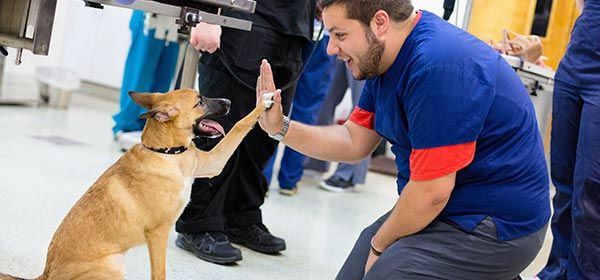
Dual Degree programs (DVM/MSc and DVM/MPH). There are two routes into our dual degree program. Successful DVM applicants with good academic credentials and an interest in research and/or public health can apply for either the dual MSc or MPH degree prior to starting the DVM. If accepted, these students devote their first term at SGU fulfilling some of the MSc or MPH requirements and then start their DVM curriculum during their second term on campus. Term 1 DVM students are made aware of the dual degree programs during orientation. Both Term 1 and Term 2 DVM students can apply for acceptance into one of the dual degree programs.
Sharing your information gives you direct access to a dedicated enrollment counselor and tailored materials based on your specific interests.
Thank you for your interest in St. George’s University. We look forward to speaking with you and answering any questions you may have. Please fill out the form for the school of your choice, and a current student or St. George’s University representative will follow up with you.